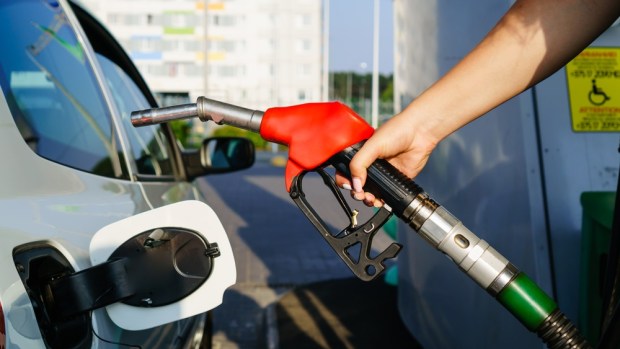Send this holiday far away, to stay.
A coalition of good government, transportation, environmental and anti-poverty organizations urged state leaders on Friday to not suspend the gas tax in this year's budget, a proposal initially promoted by disgraced former Gov. Andrew Cuomo and upstate state Sen. James Skoufis, that would swipe $2 billion in anticipated revenue.
With the budget due April 1, negotiations are down to their final frenzied moments. Neither house in the legislature pushed the governor to help fund mass transit by embracing a new formula to divvy up gas tax revenues, so advocates wrote a letter asking Albany to not do any further harm to both the environment and statewide mass transit.
The coalition, made up of Reinvent Albany, the New York State Council of Churches, the Community Service Society of New York and Tri-State Transportation Campaign, says it objects to a gas tax holiday on the grounds that it would starve transit in the name of helping drivers, who tend to be wealthier.
"A 'gas tax holiday' does little to help those New Yorkers most hurt by rising prices, takes revenue away from needed road and transit investments and completely contradicts New York’s climate goals," the coalition wrote in its letter to Albany legislators and Gov. Hochul.
The letter points out that a gas tax holiday, which would deprive the MTA of $400 million in operations funding it is counting on in 2022, could also negatively affect the agency's borrowing power.
"The MTA ... says a gas tax holiday could have a negative impact on their bond rating, which means higher borrowing costs that would need to be paid back with higher fares," the letter points out.
At a press conference in March, MTA Chairman and CEO Janno Lieber pointed out that the gas tax holiday would wreak havoc on the transit agency's borrowing capacity as it tries to navigate around a future billion-dollar budget shortfall.
"It's $400 million the first year if we were to lose the gas tax for the MTA," Lieber said on March 16. "And equally important, the gas tax secures some specific bonds, there are specific bonds secured by the petroleum business tax."
MTA Board member Andrew Albert also recently brought up the agency's possible bond peril if the gas tax gets nuked, pointing out last week that the agency's newly raised AA+ bond rating could tank if the state decides to forego the gas tax.
Fitch has raised the MTA’s bond rating to AA+, says MTA board member Andrew Albert during NYCTRC Meeting.
— Kevin Duggan (@kduggan16) March 24, 2022
That will make it cheaper for the Authority to borrow money, he notes.
He adds that a proposed state gas tax holiday would negatively affect the rating pic.twitter.com/wKEW7LPxGP
The proposed gas tax holiday legislation also directs the state the fill in any budget gaps in road repair and mass transit operations with money from the general fund, which is currently full, thanks to federal stimulus payments and better-than-expected sales and income tax revenues. But the anti-gas tax holiday coalition also used the letter to argue that the state should simply use the general fund for better-targeted social investments that help people without burning the planet and enriching petro-dictators.
Left unsaid is that a gas tax holiday doesn't even help the people it's trying to help. A comprehensive study of gas tax increases and decreases in America between 2013 and 2018 found that consumers don't even reap any benefits when they fill up at their tanks.
"An empirical analysis found that on average, one-third of an increase — or decrease — in state gasoline tax rates is passed through to consumers in the retail price on the day the change takes effect, with no significant impact after that time," researchers with ARTBA wrote in a 2020 paper. "These results confirm previous research that suggest state gas taxes are just one component of a complex pricing scheme that includes consideration of the price of crude oil and other state specific factors."
Despite the clear drawbacks and much hazier benefits of a gas tax holiday, state leaders seem intent to march on into disaster. In a surprise appearance in the Legislative Correspondent's Association press room on Friday, Hochul told reporters that a gas tax holiday was "on the table," which puts her in the same bad company as California's Gov. (and alleged environmental champion) Gavin Newsom, who recently proposed a mammoth driver bailout package in the form of $400 rebates per car owned by Californians, which the state estimated to cost $9 billion and would help struggling Californians like Jimmy Kimmel.
Summary of California gas rebate
— Peter Flax (@Pflax1) March 25, 2022
-Middle class family with one small car: $400
-Rich couple with three Escalades: $1200
-Elon Musk and Jimmy Kimmel: $800 each
-Person with one EV: $400
-Person who gets around on transit: 3 months free transit
-Person with an e-bike: Nothing
In addition to giving people money simply for owning cars, Newsom is also considering suspending the gas tax the state collects on diesel fuel, which would cost $600 million, and foregoing a gas tax adjustment, which will cost the state $523 million. On the other hand, the California executive is proposing just $750 million to fund free transit statewide for just three months.






